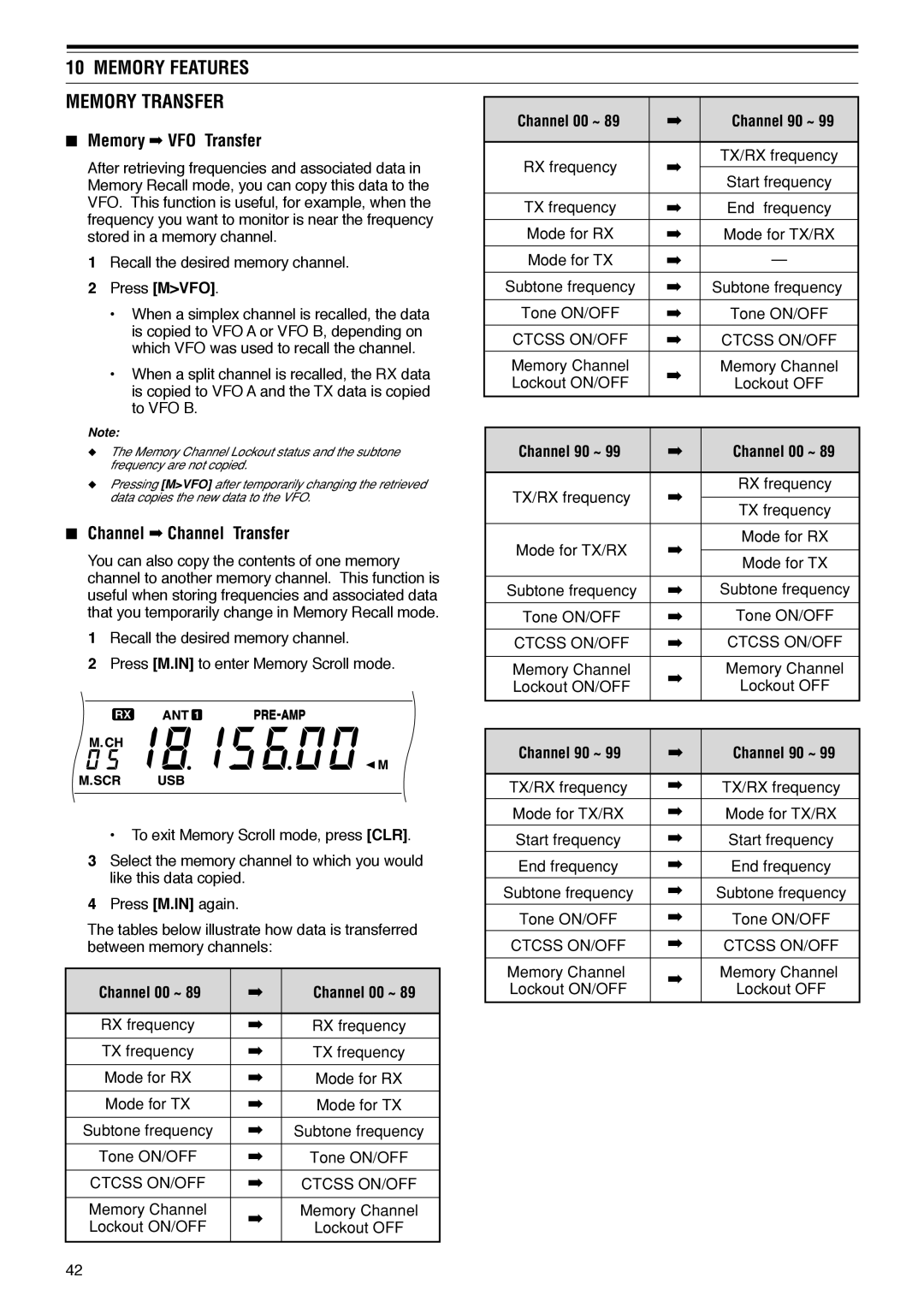
10 MEMORY FEATURES |
|
|
| |
MEMORY TRANSFER |
|
|
| |
Channel 00 ~ 89 | ➡ | Channel 90 ~ 99 | ||
■ Memory ➡ VFO Transfer | ||||
|
|
| ||
RX frequency | ➡ | TX/RX frequency | ||
After retrieving frequencies and associated data in | ||||
| ||||
Start frequency | ||||
Memory Recall mode, you can copy this data to the |
|
| ||
VFO. This function is useful, for example, when the | TX frequency | ➡ | End frequency | |
frequency you want to monitor is near the frequency | ||||
|
|
| ||
Mode for RX | ➡ | Mode for TX/RX | ||
stored in a memory channel. | ||||
1 Recall the desired memory channel. | Mode for TX | ➡ | — | |
2 Press [M>VFO]. | Subtone frequency | ➡ | Subtone frequency | |
|
|
|
| |
• When a simplex channel is recalled, the data | Tone ON/OFF | ➡ | Tone ON/OFF | |
is copied to VFO A or VFO B, depending on |
|
|
| |
CTCSS ON/OFF | ➡ | CTCSS ON/OFF | ||
which VFO was used to recall the channel. | ||||
|
|
| ||
Memory Channel |
| Memory Channel | ||
• When a split channel is recalled, the RX data | ➡ | |||
Lockout ON/OFF | Lockout OFF | |||
is copied to VFO A and the TX data is copied |
| |||
|
|
| ||
to VFO B. |
|
|
|
Note:
◆The Memory Channel Lockout status and the subtone frequency are not copied.
◆Pressing [M>VFO] after temporarily changing the retrieved data copies the new data to the VFO.
■Channel ➡ Channel Transfer
You can also copy the contents of one memory channel to another memory channel. This function is useful when storing frequencies and associated data that you temporarily change in Memory Recall mode.
1 Recall the desired memory channel.
2 Press [M.IN] to enter Memory Scroll mode.
•To exit Memory Scroll mode, press [CLR].
3Select the memory channel to which you would like this data copied.
4Press [M.IN] again.
The tables below illustrate how data is transferred between memory channels:
Channel 00 ~ 89 | ➡ | Channel 00 ~ 89 | |
|
|
| |
RX frequency | ➡ | RX frequency | |
|
|
| |
TX frequency | ➡ | TX frequency | |
|
|
| |
Mode for RX | ➡ | Mode for RX | |
|
|
| |
Mode for TX | ➡ | Mode for TX | |
|
|
| |
Subtone frequency | ➡ | Subtone frequency | |
|
|
| |
Tone ON/OFF | ➡ | Tone ON/OFF | |
|
|
| |
CTCSS ON/OFF | ➡ | CTCSS ON/OFF | |
|
|
| |
Memory Channel | ➡ | Memory Channel | |
Lockout ON/OFF | Lockout OFF | ||
| |||
|
|
|
Channel 90 ~ 99 | ➡ | Channel 00 ~ 89 | |
|
|
| |
TX/RX frequency | ➡ | RX frequency | |
| |||
TX frequency | |||
|
| ||
|
|
| |
Mode for TX/RX | ➡ | Mode for RX | |
| |||
Mode for TX | |||
|
| ||
|
|
| |
Subtone frequency | ➡ | Subtone frequency | |
|
|
| |
Tone ON/OFF | ➡ | Tone ON/OFF | |
|
|
| |
CTCSS ON/OFF | ➡ | CTCSS ON/OFF | |
|
|
| |
Memory Channel | ➡ | Memory Channel | |
Lockout ON/OFF | Lockout OFF | ||
| |||
|
|
| |
|
|
| |
Channel 90 ~ 99 | ➡ | Channel 90 ~ 99 | |
|
|
| |
TX/RX frequency | ➡ | TX/RX frequency | |
|
|
| |
Mode for TX/RX | ➡ | Mode for TX/RX | |
|
|
| |
Start frequency | ➡ | Start frequency | |
|
|
| |
End frequency | ➡ | End frequency | |
|
|
| |
Subtone frequency | ➡ | Subtone frequency | |
|
|
| |
Tone ON/OFF | ➡ | Tone ON/OFF | |
|
|
| |
CTCSS ON/OFF | ➡ | CTCSS ON/OFF | |
|
|
| |
Memory Channel | ➡ | Memory Channel | |
Lockout ON/OFF | Lockout OFF | ||
| |||
|
|
|
42
